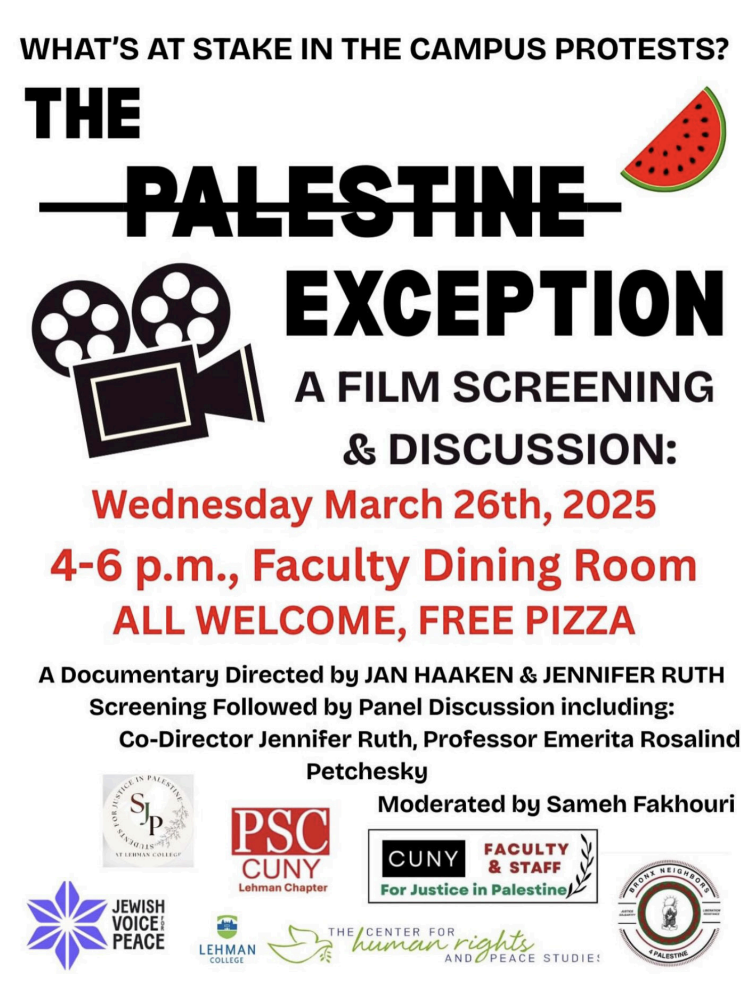“The Palestine Exception” Brought to Students Despite Pushback
Poster advertising screening of The Palestine Exception
By Gilbert AreizagaOn March 26, Lehman College hosted a screening of the film The Palestine Exception in collaboration with the Center for Human Rights and Peace Studies, the Professional Staff Congress (PSC-CUNY), Jewish Voice for Peace (JVP), Students for Justice in Palestine, CUNY Faculty & Staff for Justice in Palestine (FSJP), and Bronx Neighbors for Palestine. It was followed by a panel featuring co-director of the film Jennifer Ruth, Hunter College professor and JVP Emerita member Rosalind Petchesky, and Reem Ockeh, a member of the Lehman chapter of SJP.The Palestine Exception focuses on the many student protests for Palestinian rights that have taken place across the country, with the “exception” referring to the seemingly disproportionate actions taken against students at these protests compared to those for other issues. Through interviews with staff and students subjected to harsh encounters with law enforcement and questioning by government officials, the film highlights how policed these protests are—stating that between 2023 and 2024, 3,100 students were arrested during these protests. The movie also draws parallels to other student and Civil Rights protests of past decades, such as those held against the Vietnam War. It compares the punishments students have received for being pro-Palestine to those experienced during McCarthyism and argues that free speech and academic freedom are in danger now more than ever.During the panel discussion, co-director Ruth said that the decision to film at Hunter and to offer to screen this event at both public and private universities, including Lehman, was made to show that this issue is not just for “elite students,” but rather that student efforts are taking place all over the country at all levels, with some of the largest encampments being at smaller schools. Petchesky elaborated further, saying that one of the target audiences of this film were “liberals who want to speak up but are afraid to be called antisemitic.” She also added that, as a Jewish person, it is harder to navigate these conversations with other members of the community, but by finding an opening with relatives such as, “I’m Zionist but I hate Netanyahu,” the discussion could begin. She went further, saying that to support Israel at this point would be “supporting ethnonationalism and settler colonialism.”“STUDENTS HAVE A RIGHT TO TALK ABOUT THESE THINGS.” – Ruth Wangerin, Lehman anthropology professor and PSC CUNY member
The war in Gaza is one of the most contentious issues of the day, and the Lehman screening met with pushback prior to the actual event. One of the organizers, anthropology professor and PSC member Ruth Wangerin, shared that a number of posters advertising the event were torn down and replaced with a printout titled Crimes by Iran, Hezbollah, Hamas (short list)—followed by several lines of statistics such as “SYRIA: 400,000 ARE KILLED,” with no source cited, and the injunction: “Do not fall victims of anti-Semitic propaganda!!!” Three members of the PSC also voiced disapproval of the union’s decision to sponsor this event. One, who wished to remain anonymous due to the sensitivity of this topic, stated, “Showing controversial political films on campus can be fine, depending on the context. But I don’t believe that publicizing the showing of this particular film was the proper role of the PSC union. There are labor/workplace issues that should be the focus of the attention of the union.” The other two members agreed, with divisiveness among students being their next biggest concern.Given these objections, Renee Bell, a math professor at Lehman and one of the organizers of the event, said, “I was a little bit worried, but I’m in a much more secure place than the students who have a lot more on the line, and that inspires me to do something like this.” Wangerin added, “What I had in mind was to do it. To say ‘We can do it. The sky will not fall.’”Responses to the film were mixed. One attendee stated, “It should be justice for Palestine and Israel.”One Lehman student who attended the screening, Mohamed Morshed, said he related to the film’s message. “I’ve experienced this type of silencing and oppression,” he said. “I remember at my graduation last year I held up the Palestinian flag. I saw later on YouTube that they cut it [out].”The goal of the event was to get as many eyes on this issue as possible, so that more people would be able to gain insight into student protests—why they are happening and what the consequences could be. Wangerin stated, “Students have a right to talk about these things. They have a right to participate, not in an underground, but an open, aboveground major event… It’s important to establish that this is okay, this is normal to do, this is what university students do.”
